Key takeaways
- A musician portfolio should reflect an artist’s journey, including elements like biography, discography, performance highlights, and visuals to connect with audiences.
- Skill refinement is enhanced through collaboration and constructive feedback, as experienced at Berklee, which fosters community growth rather than just individual progress.
- Effective practice techniques, such as goal setting and using a metronome, significantly improve musicianship and self-awareness.
- Networking opportunities, such as jam sessions and workshops, are essential for building connections and advancing in the music industry.
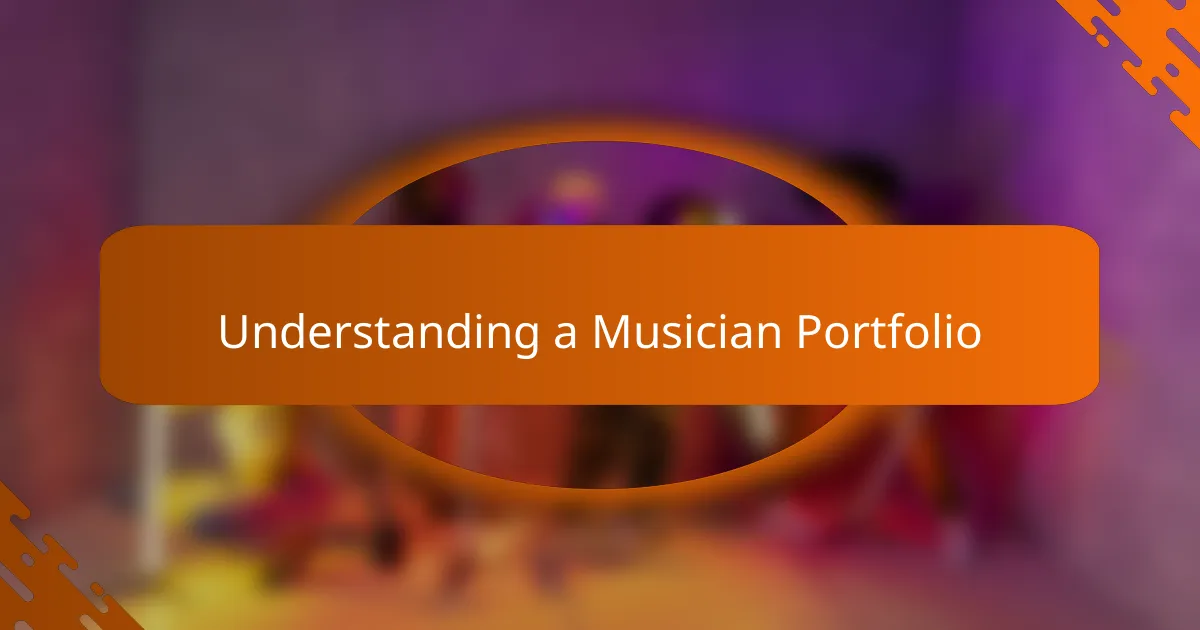
Understanding a Musician Portfolio
Creating a musician portfolio is more than just compiling a list of achievements or recordings; it’s a personal reflection of your artistic journey. When I began crafting my own portfolio, I realized that it had to tell my story, showcasing not only my technical skills but also my unique voice and style. I remember sitting down with a cup of coffee, flipping through old recordings and gig flyers, and feeling a rush of nostalgia as I relived those moments that shaped me as a musician.
In building a well-rounded portfolio, consider these essential components:
- Biography: Share your musical background, influences, and experiences that make you who you are as an artist.
- Discography: Include your releases, live recordings, or collaborative projects, so listeners can explore your music easily.
- Performance Highlights: List notable gigs or festivals where you’ve performed to illustrate your live experience.
- Press Kit: Incorporate reviews, articles, or interviews that highlight your work and accomplishments.
- Visuals: Use engaging photos or videos from performances to give a visual element that complements your sound.
Every piece speaks to potential collaborators and fans, allowing them to connect with you on a deeper level.
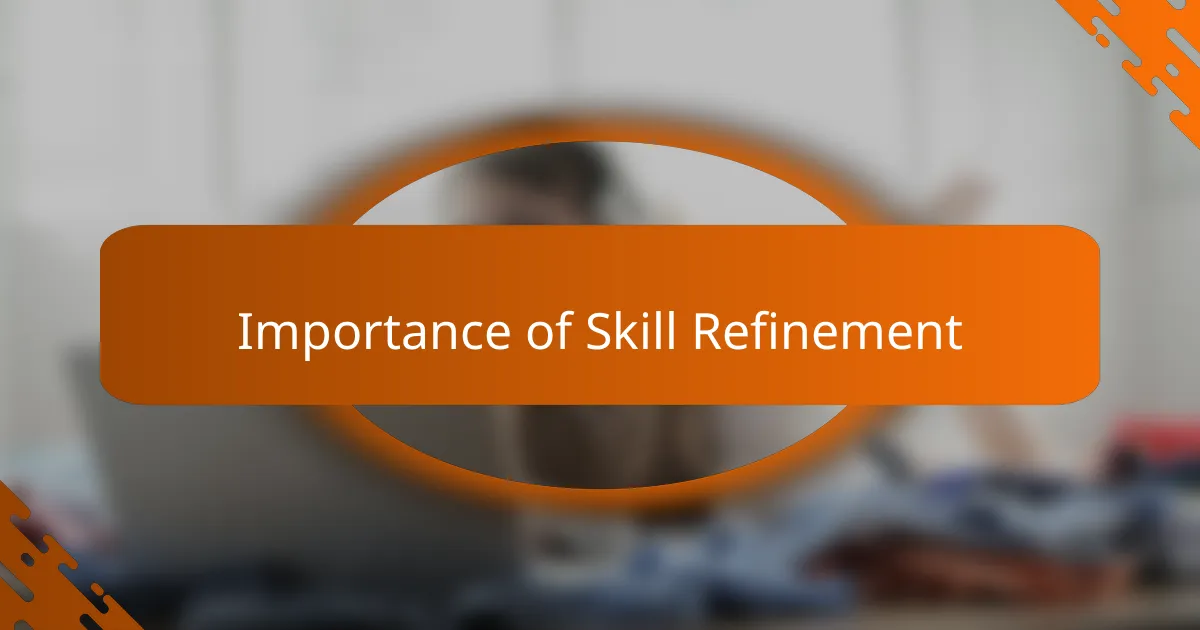
Importance of Skill Refinement
Refining my skills at Berklee was pivotal in shaping my musical journey. I realized early on that mere talent isn’t enough; it’s the consistent practice and lesson-based learning that elevate one’s abilities. Being surrounded by talented peers taught me the importance of collaboration and constructive feedback, which fueled my growth in ways I hadn’t anticipated.
One specific experience I had was during a group project where we had to create an original composition. The process of exchanging ideas, critiquing each other’s techniques, and then applying constructive criticism was truly enlightening. It wasn’t just about enhancing my own skills; it was about developing a sense of musical community, which I found deeply rewarding.
Here’s a comparison of general skill refinement versus what I experienced at Berklee:
| General Skill Refinement | Skill Refinement at Berklee |
|---|---|
| Self-taught methods | Guided by experienced instructors |
| Limited feedback | Constructive critique from peers and mentors |
| Less collaboration | Collaboration in group settings |
| Focus on individual growth | Community and shared growth |
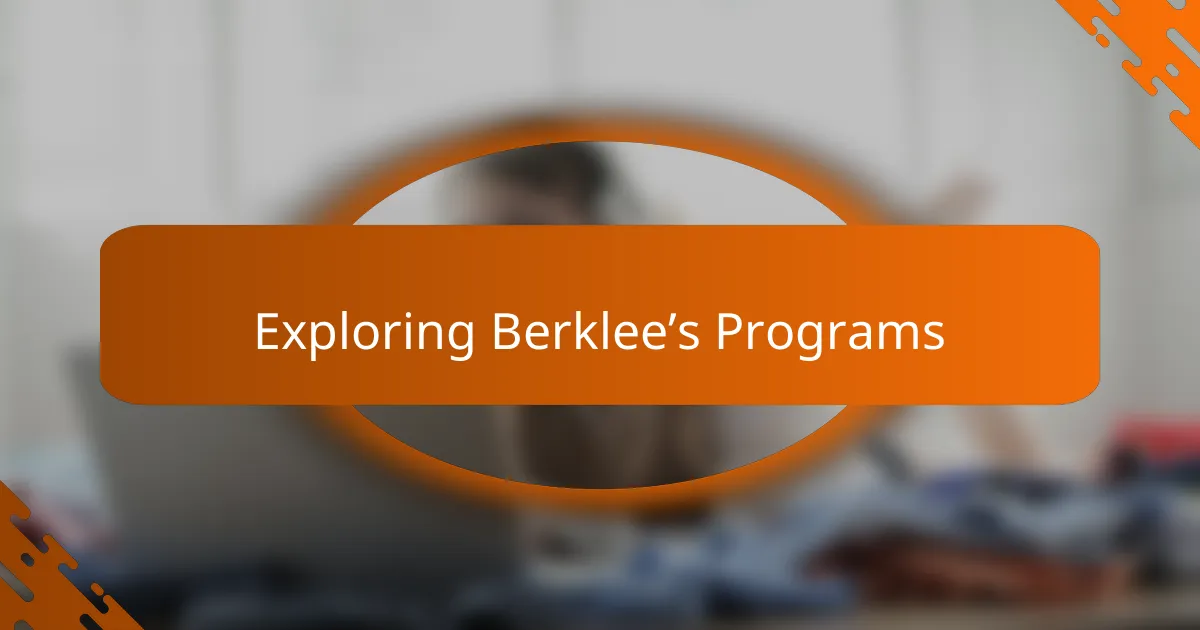
Exploring Berklee’s Programs
When I first arrived at Berklee, I was immediately struck by the wealth of musical programs available. Each program offers a unique perspective, whether you’re into contemporary music, performance, or music production. I remember diving into the Music Production program, which not only honed my technical skills but also boosted my confidence to experiment creatively.
One of my favorite things about Berklee’s environment was how diverse the programs were. I often found myself attending workshops outside my major, soaking up knowledge from friends studying film scoring and music therapy. There’s something magical about learning from others’ passion and expertise, which enriched my own musical journey.
Here’s a comparison of a few key programs that I found particularly eye-opening during my time there:
| Program | Focus |
|---|---|
| Music Performance | Developing stage presence and technique |
| Music Production | Learning audio engineering and production techniques |
| Film Scoring | Composing music for visual media |
| Music Therapy | Using music as a healing tool |
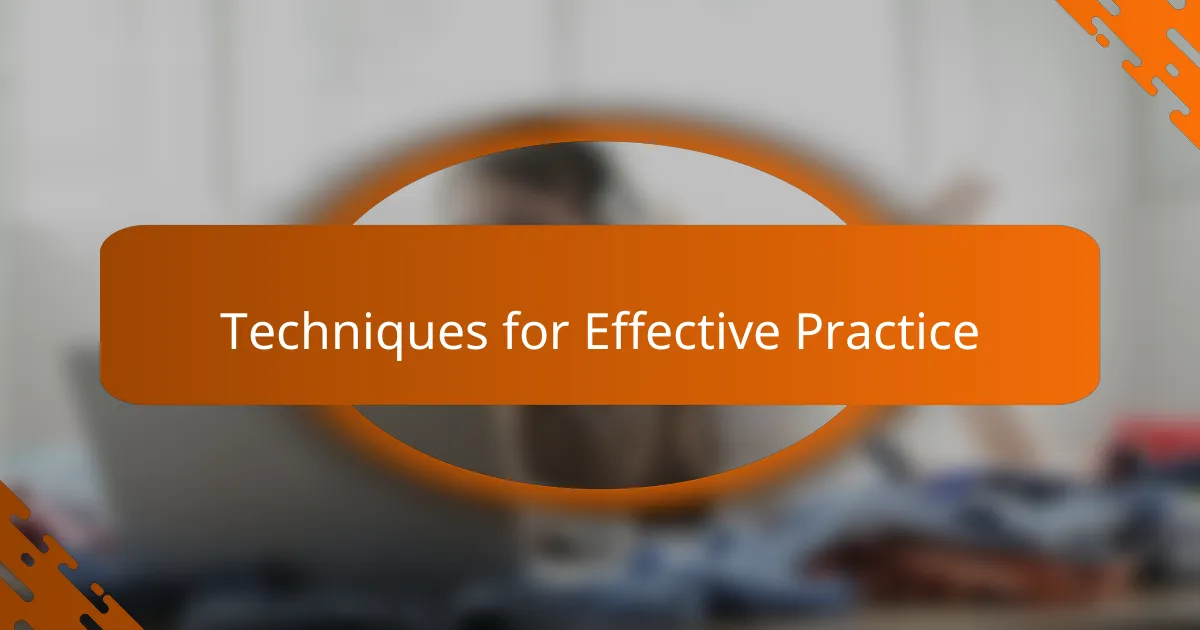
Techniques for Effective Practice
One of the techniques I found most effective during my time at Berklee was setting specific goals for each practice session. Instead of just running through scales or pieces, I focused on what I wanted to improve, whether it was speed, articulation, or emotional expression. This approach not only kept my practice sessions engaging but also helped me track my progress more steadily.
Another method that worked wonders was the use of a metronome. I remember struggling with timing in certain pieces, which made me feel frustrated. Incorporating a metronome into my practice helped me build a strong sense of rhythm and gave me the confidence to perform without fear of speeding up or slowing down unexpectedly.
Lastly, I made it a point to record myself regularly. Listening back to my practice sessions opened my eyes to areas I hadn’t noticed before. There’s something incredibly valuable about hearing yourself play – it enhances self-awareness and provides motivation for continuous improvement.
| Technique | Description |
|---|---|
| Goal Setting | Focus on specific areas to improve for each practice session. |
| Using a Metronome | Builds a strong sense of rhythm and timing. |
| Recording Sessions | Enhances self-awareness and highlights areas for improvement. |
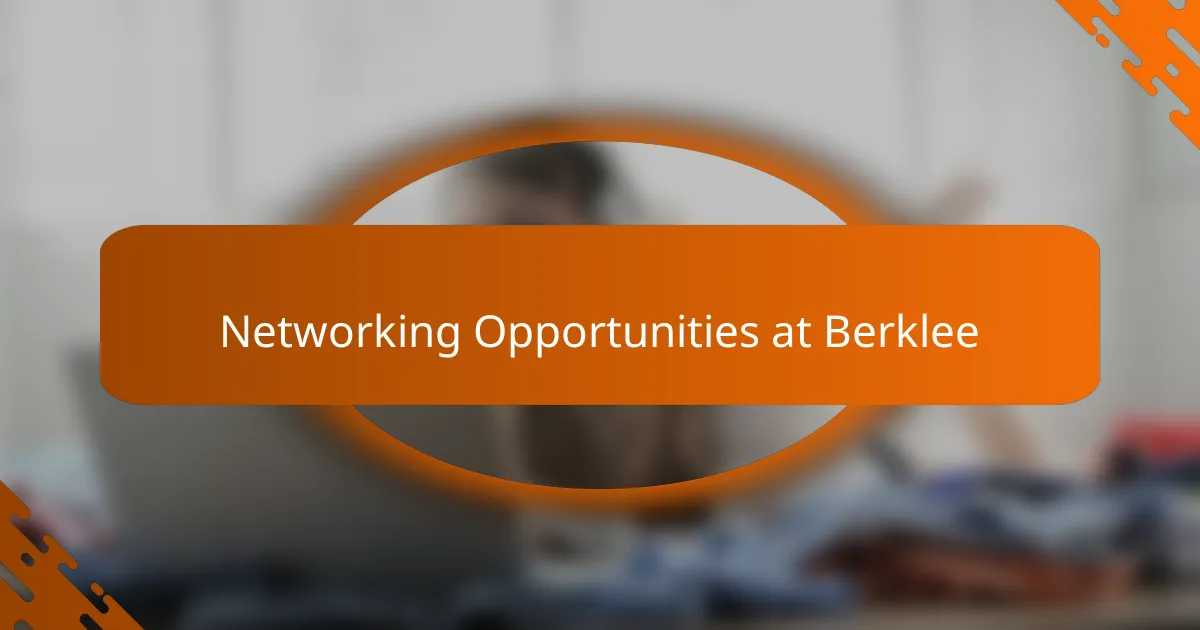
Networking Opportunities at Berklee
When I attended Berklee, I quickly realized that networking was just as crucial as honing my musical skills. I remember attending a jam session and striking up a conversation with a fellow guitarist who ended up being a key collaborator on my first EP. Those spontaneous interactions allowed me not just to learn from others, but also to share my own experiences, which built genuine connections in the music community.
The opportunities to network at Berklee are abundant and varied. Here are some key ways I found those connections:
- Jam Sessions: Informal gatherings where musicians can showcase their skills and network naturally.
- Workshops and Masterclasses: Events where seasoned professionals share their expertise and provide insight into the industry.
- School Events and Performances: Attending these allows you to meet fellow students and industry figures in a more relaxed environment.
- Student Organizations: Joining clubs related to your interests can lead to meeting like-minded musicians.
- Social Media Groups: Engaging in Berklee-centric online communities helps to maintain connections beyond the campus.
Each interaction felt like a stepping stone, leading me closer to my goals in music.
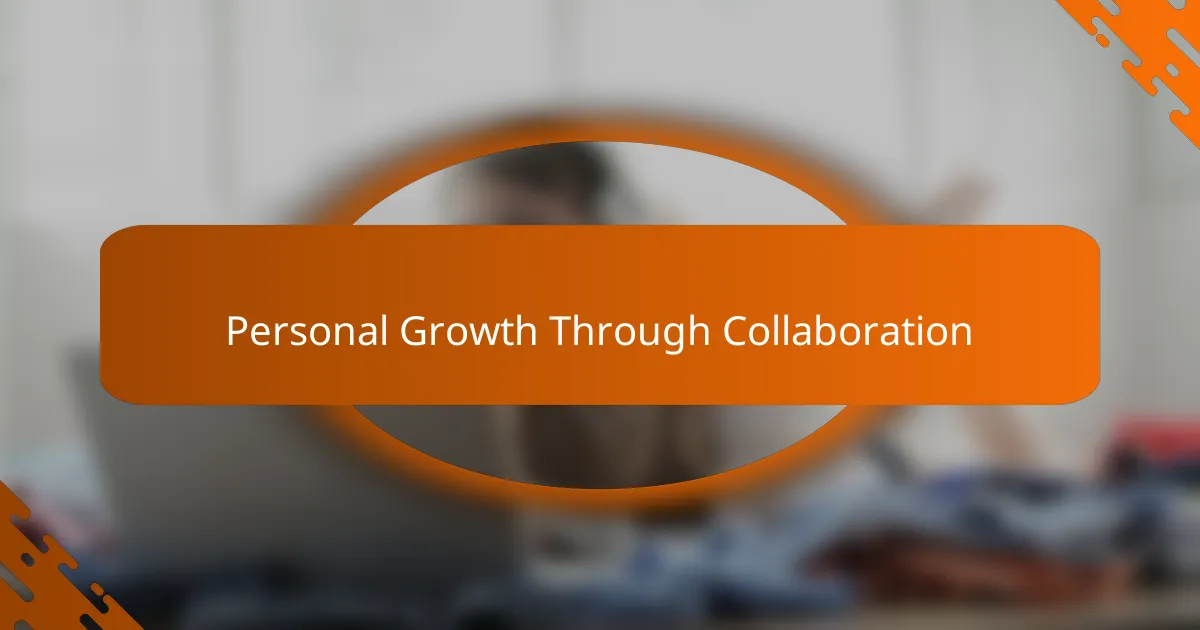
Personal Growth Through Collaboration
During my time at Berklee, collaboration became a cornerstone of my personal growth. I remember jamming with fellow musicians from different backgrounds. This melting pot of ideas not only enhanced my skills but also taught me the importance of listening and adapting. The experience was both humbling and transformative.
One of my most memorable collaborations involved a singer-songwriter from Brazil. Her unique rhythms challenged me to step outside my comfort zone. Pushing myself in this way opened up new creative avenues, making me realize that vulnerability during collaboration fuels genuine artistic expression.
Working in diverse teams also fostered lasting friendships. The sense of community at Berklee is palpable, and I’m grateful for the connections I built. Every project felt like a shared journey of growth, revealing that my path as a musician could be enriched by the talents of others.
| Collaboration Aspect | Personal Experience |
|---|---|
| Listening Skills | Learning to actively listen enhanced my musical timing and creativity. |
| Cross-Genre Learning | Collaborating with diverse musicians expanded my repertoire and pushed my creative boundaries. |
| Emotional Connections | Bonding with fellow artists helped build a supportive network, essential for growth. |
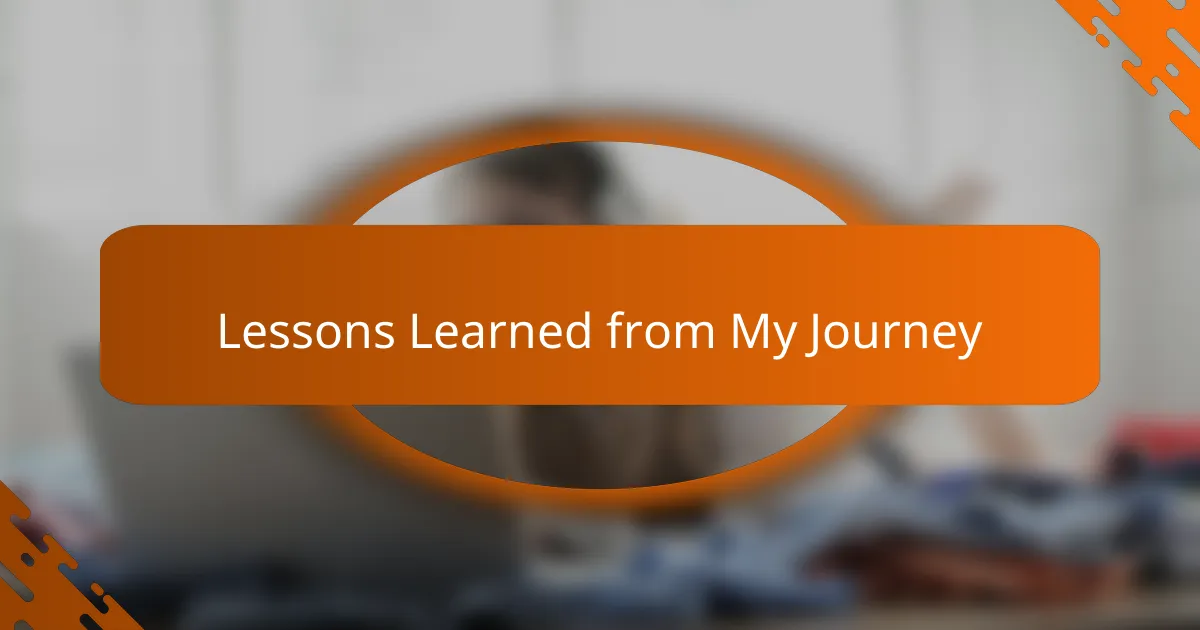
Lessons Learned from My Journey
As I reflect on my journey through Berklee, I realize that every lesson was rooted in experience. One profound revelation was understanding the power of vulnerability in music. In one of my early collaborations, I hesitated to share my ideas, fearing judgment. However, once I let my guard down, I discovered how openness could inspire others and cultivate genuine creativity. Have you ever felt that shift when you stop holding back? I certainly have, and it was liberating.
I also learned that resilience is vital. There were countless moments of self-doubt, especially when facing feedback from peers or instructors. One time, I received a critique that initially stung, but instead of shutting down, I chose to embrace it. That experience taught me to view criticism as a stepping stone for growth rather than a setback. It sparked a desire to refine my craft further, leading me to produce work that I now take pride in.
Finally, the importance of community cannot be overstated. Berklee was a bustling hub where collaboration thrived. I remember forming bonds with other musicians, sharing late-night jam sessions, and exploring each other’s influences. It was in these communal spaces that I learned the essence of music isn’t just about the notes played, but about the connections formed along the way. If you could look back at your own musical journey, what connections stand out to you? For me, those friendships have become a vital part of who I am today as an artist.